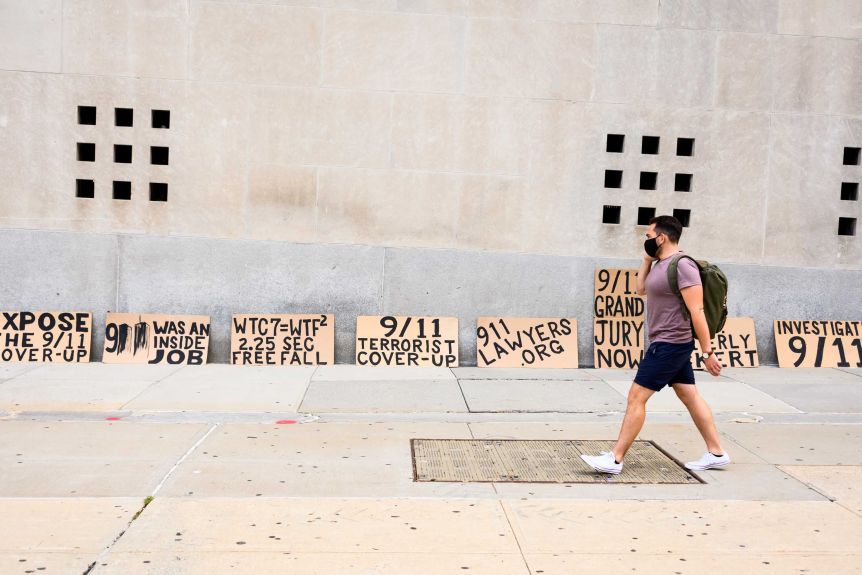From coronavirus to 5G, uncertainty breeds conspiratorial thinking. Here’s how it happens
When are you being sceptical and when are you being conspiratorial? It’s not always easy to tell the difference.
Conspiracy theories flourish in moments of disruption — and a pandemic, most likely caused by the seemingly random transmission of a virus from an animal to a human, can be hard to wrap our heads around.
People are often uncomfortable with this kind of randomness, says John Cook, a cognitive psychologist at George Mason University who studies conspiratorial thinking.
Instead, we might be more comfortable with the idea that it was planned.
“It’s more psychologically satisfying to have an explanation that has purpose and meaning behind it,” he says.
But we’re also justified in asking questions: about whether the government is handling the crisis well, for example, or whether faster international action could have prevented the virus’s spread.
To distinguish conventional thinking and healthy scepticism from conspiracy, we first need to understand the traits of conspiratorial thinking.
Recognise the traits of conspiratorial thinking — even in yourself
Most people don’t think of themselves as conspiracy theorists, even if they believe in what most would consider a conspiracy theory.
“They see themselves as realists with their eyes open and everyone else has their eyes shut,” Dr Cook says.
And many of the people pushing conspiracy theories do so to further a social or political agenda — or to sell something.
In their Conspiracy Theory Handbook, Dr Cook and Stephan Lewandowsky describe seven traits of conspiratorial thinking or CONSPIR.
- C is for “contradictory” or believing in ideas that are mutually contradictory.
- O is for “overriding suspicion” of any official account.
- N is for “nefarious intent” or presuming the forces behind the conspiracy have evil intentions.
- S is for “something must be wrong”. Even if a particular theory is abandoned, the conspiracy theorist will not give up the overarching idea that something is awry.
- P is for believing yourself to be the “persecuted victim” — often, both the victim of evil and the hero seeking to expose it.
- I is for “immune to evidence” and especially, as Dr Cook says, “evidence that you provide that disproves the conspiracy they reinterpret as being part of the conspiracy”.
- R is for “reinterpreting randomness” — connecting the dots where there is nothing to connect.
This last idea, of seeing patterns where there isn’t one, has been prominent during the pandemic.
Dr Cook points to the conspiracy that 5G and the coronavirus outbreak are somehow connected — just because both the rollout of the technology and the disease began in 2019.
“It’s obviously a logically flawed argument,” he said.
Once you start to think in a conspiratorial way you become very mistrustful, says Karen Douglas, a social psychologist at the University of Kent, who studies the psychology of conspiracy theories.
“You are very cynical about information that you receive from scientists and experts,” Professor Douglas says.
“And then, you might start to look for information elsewhere because you don’t trust official sources.”
Being sceptical and questioning vs being conspiratorial
It’s often healthy to question what you’re told.
Throughout history there have been some real conspiracies. As Dr Cook points out, the tobacco industry was convicted of activity that deceived the public about the health impacts of cigarettes.
But when does healthy scepticism become conspiratorial thinking?


Dr Cook says two traits from the CONSPIR list are particularly important to this distinction: overriding suspicion and immunity to evidence.
“If a person displays nihilistic distrust of all institutional data (NASA fake their data! You can’t trust what the WHO say!) rather than healthy scepticism, and if a person is immune to changing their mind, those are telltale traits of a baseless conspiracy theory,” Dr Cook says.
Do you recognise these personality traits?
There’s no specific personality profile of a conspiracy theorist — everyone has the potential to fall prey to conspiracy theories, says Professor Douglas.
But we are at greater risk of being swayed by them, or finding them more appealing, if some of our psychological needs are not being met. These can be grouped into three main clusters.
- The first one is the need for knowledge and certainty.
“Nobody likes to be uncertain, everybody likes to have the truth. And when that’s frustrated then conspiracy theories might seem to offer some kind of truth,” Professor Douglas says.
- The second is wanting to feel safe in the world that you live in.
We all want to feel that we have some level of power.
“If you believe in conspiracy theories, that can enable you to feel that maybe you have a piece of information that gives you back a sense of power so you feel you’re regaining some sense of autonomy over things that are happening to you,” Professor Douglas explains.
- The third set of psychological needs are social needs, like wanting to feel good about yourself and the groups you belong to, and having a high level of self-esteem.
“Conspiracy theories might allow you to feel good about yourself.
“It allows you in a way to feel that you have information that other people don’t have, which enables you to sort of feel a bit better than other people.”
According to Professor Douglas, this last point is why you find that people who are quite narcissistic tend to believe in conspiracy theories.
How to undo the damage of conspiracy theories


Dr Cook believes we can’t necessarily counter conspiracy theories by changing the minds of conspiracy theorists — typically, a very difficult task if they are “far down the rabbit hole”.
Instead, it can be more effective to “inoculate” the larger population — those who are vulnerable to the misinformation that these theorists generate — to make them less relevant and damaging.
“You build up people’s immunity to a disease by exposing them to a weakened version of the disease,” he says.
“If we explain to people the techniques used to mislead or the traits of conspiratorial thinking, that builds up their resistance.”
Also called pre-bunking, like debunking but earlier, the goal is to help people recognise how conspiratorial thinking works and the techniques used to spread such theories.
Professor Douglas’s research shows that if a large group of people are provided with factually correct information before they’re exposed to the conspiracy theory, it has less chance to take root and influence their attitudes and behaviours.
“But if the conspiracy theory gets in first, then it’s difficult to refute it with the factual information, because conspiracy theories … tend to be more powerful,” she says.
If you are trying to talk to a friend or family member who has taken a turn down a conspiratorial path, Dr Cook says it is essential to approach the conversation with empathy.
“While not conceding that the conspiracy theory is true … try to connect to them with shared values and in particular the shared value of critical thinking.”
It can be tempting either to ignore conspiracy theorists or aggressively confront them, but ultimately, neither approach may serve us.
When a theory reaches a tipping point or nears the mainstream, it can have serious consequences, Professor Douglas says.
“They’re not just sort of trivial ideas about things that are going on in the world.
“They can have negative consequences, such as people are reluctant to actually go out and do something about coronavirus, like wash their hands, social distance, all that sort of stuff, if they believe it’s a hoax.”
*** This article has been archived for your research. The original version from ABC News can be found here ***


